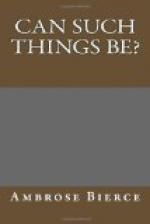One moonlight night several years afterward I was passing through Union square. The hour was late and the square deserted. Certain memories of the past naturally came into my mind as I came to the spot where I had once witnessed that fateful assignation, and with that unaccountable perversity which prompts us to dwell upon thoughts of the most painful character I seated myself upon one of the benches to indulge them. A man entered the square and came along the walk toward me. His hands were clasped behind him, his head was bowed; he seemed to observe nothing. As he approached the shadow in which I sat I recognized him as the man whom I had seen meet Julia Margovan years before at that spot. But he was terribly altered—gray, worn and haggard. Dissipation and vice were in evidence in every look; illness was no less apparent. His clothing was in disorder, his hair fell across his forehead in a derangement which was at once uncanny and picturesque. He looked fitter for restraint than liberty—the restraint of a hospital.
With no defined purpose I rose and confronted him. He raised his head and looked me full in the face. I have no words to describe the ghastly change that came over his own; it was a look of unspeakable terror—he thought himself eye to eye with a ghost. But he was a courageous man. “Damn you, John Stevens!” he cried, and lifting his trembling arm he dashed his fist feebly at my face and fell headlong upon the gravel as I walked away.
Somebody found him there, stone-dead. Nothing more is known of him, not even his name. To know of a man that he is dead should be enough.
THE HAUNTED VALLEY
I—HOW TREES ARE FELLED IN CHINA
A half-mile north from Jo. Dunfer’s, on the road from Hutton’s to Mexican Hill, the highway dips into a sunless ravine which opens out on either hand in a half-confidential manner, as if it had a secret to impart at some more convenient season. I never used to ride through it without looking first to the one side and then to the other, to see if the time had arrived for the revelation. If I saw nothing—and I never did see anything—there was no feeling of disappointment, for I knew the disclosure was merely withheld temporarily for some good reason which I had no right to question. That I should one day be taken into full confidence I no more doubted than I doubted the existence of Jo. Dunfer himself, through whose premises the ravine ran.
It was said that Jo. had once undertaken to erect a cabin in some remote part of it, but for some reason had abandoned the enterprise and constructed his present hermaphrodite habitation, half residence and half groggery, at the roadside, upon an extreme corner of his estate; as far away as possible, as if on purpose to show how radically he had changed his mind.
This Jo. Dunfer—or, as he was familiarly known in the neighborhood, Whisky Jo.—was a very important personage in those parts. He was apparently about forty years of age, a long, shock-headed fellow, with a corded face, a gnarled arm and a knotty hand like a bunch of prison-keys. He was a hairy man, with a stoop in his walk, like that of one who is about to spring upon something and rend it.




